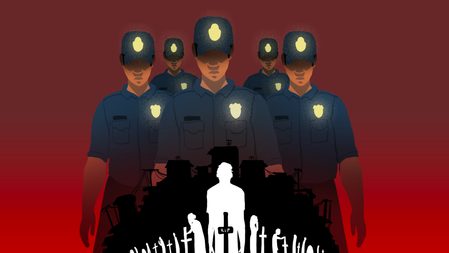In the case of People vs Cervantes, the “People” or the prosecutor was of no help in getting a conviction for the policemen who killed father and son Luis and Gabriel Bonifacio in former president Rodrigo Duterte’s drug war. In fact, Deputy City Prosecutor (DCP) Darwin Cañete even testified for the accused.
The legal victory, according to human rights lawyers, was all thanks to the family, the forensic doctor, and them private lawyers.
The Caloocan City Regional Trial Court Branch 121 on Tuesday, June 18, handed down a guilty verdict on four local cops for homicide. It was only the fourth known case of conviction of cops in Duterte’s war on drugs.

While a statement by Justice Secretary Boying Remulla was quick to praise the prosecution, the private prosecutors – the human rights lawyers from the National Union of Peoples’ Lawyers (NUPL) – immediately publicly clarified that the court-assisted prosecutor, Cañete, “never lifted a finger to help.”
Private lawyers can be deputized as private prosecutors, especially if they built the case from Day 1, and there had been a long tradition of productive partnerships between public prosecutors and the private lawyers. In unproductive partnerships, complaints about who did what usually remained hush-hush.
But not their complaint about for Cañete, who is notorious for being hostile toward drug war victims. He once said publicly that the innocence of the slain 17-year-old Kian De Los Santos “was too far-fetched.” Delos Santos was killed in Caloocan by local cops, Cañete’s turf, and became the first conviction of police in the drug war.
At the height of Duterte’s popularity and the raging drug war, Cañete said the “yellows,” referring to the opposition Liberal Party, should be killed “like cockroaches.”
According to NUPL president Ephraim Cortez, Cañete “just sat and watched the proceedings with a gaping mouth waiting for the fruit to fall.”
“The public prosecutor did not actively participate in the prosecution of the case. He even testified for the accused,” said NUPL’s Kristina Conti, who represented Mary Ann Domingo, matriarch of the Bonifacio family, in court.
The court ruling reveals that Cañete was presented as a hostile witness for the cops. Hostile witnesses are people who are on the other side, but, for one reason or another, is tapped by the other side to testify for them.
For this case, it was because when the killing happened in September 2016, Cañete was the Department of Justice (DOJ) representative who witnessed the inventory of the buy-bust, one of the requirements of the law.
However, when Cañete was asked about his report that identified the policemen as having killed the victims, “DCP Cañete admitted that the said information was only provided for him by the investigator as he has no personal knowledge of the actual shooting incident.”
Conti added: “DCP Darwin Cañete said he had been summoned to the site in 2016, and then issued a report stating that no family had come forward to press charges. When this case got to court in 2021, he was the court-assigned trial prosecutor.”
Milestone?
Remulla said the conviction was “a milestone in our criminal justice system, a testament to the government’s unwavering efforts to safeguarding human rights in the pursuit of justice and a clear proof of a functioning justice system.”
But Conti countered: “No, you cannot make me say that the justice system is working. For NUPL-NCR, this is the only remaining tokhang case we could bring to court. We lost in the Supreme Court our bid to upgrade the charges from homicide to murder and to implead all those who participated in the operation (this was a homicide case against the four policemen admitted firing shots). Sadly, this case was more of an exception rather than the rule.”
Conti said that the NUPL-NCR “built this case from Day 1 without any material assistance from the DOJ, police, or government agencies,” aside from the Commission on Human Rights.
She said “cases like this,” referring to drug war cases against the police, only reach the court because of private investigation and forensics by Dr. Raquel Fortun, who had been helping drug war victims, even to the point of exhuming some bodies to build a case.
The drug war reinvestigation by the DOJ, consisting only of 52 cases out of the 7,000 killed by police men, has not showed substantial results. Of the 52, only five cases reached court. Human rights advocates had slammed this reinvestigation as only a ruse to deceive the International Criminal Court (ICC) that local justice is working.
It is estimated that as many as 30,000 people were killed in the drug war, including those killed by vigilantes. Aside from Bonifacio and Delos Santos, two other cases have had convictions.
In 2022, Patrolman Jeffrey Perez was convicted of torture and planting of evidence in relation to the killing of teens Carl Angelo Arnaiz and Reynaldo “Kulot” de Guzman. In March 2023, a Navotas court convicted the same cop for the murder of Arnaiz and De Guzman.
There have only been eight policemen convicted in relation to Duterte’s drug war: three for Delos Santos, one for Arnaiz and De Guzman (the other cop died during the trial), and four for the Bonifacios.
Only a number of drug war families file complaints because pursuing legal action means exposing themselves to harassment or even death, especially in drug war operations where the suspect cops are part of their own communities. The struggle to pursue local cases pushed the drug war families to pin their hopes on the ICC, which is currently looking into the drug war killings. – Rappler.com
